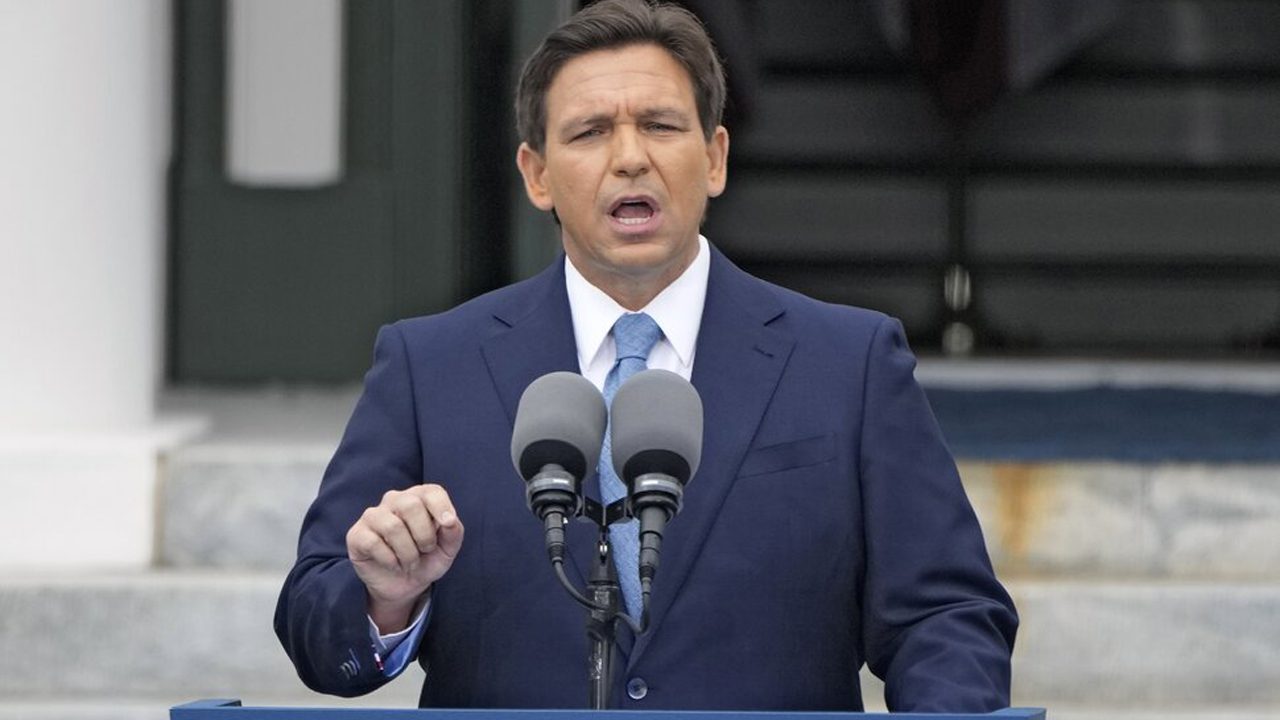
National Teachers Union Presidents Slam DeSantis in a Preview of 2024 Education Politics
U.S. News | By Lauren Camera | March 20, 2023
The powerful labor groups accused the Florida governor and potential GOP presidential candidate of having a dangerous agenda aimed at destroying the public school system.
The presidents of the two national teachers unions took Florida Gov. Ron DeSantis to task in his home state over the weekend, slamming the Republican and likely 2024 presidential candidate for attempting to dismantle the U.S. public education system – underscoring the seriousness with which they see him as a threat to K-12 education and foretelling the lengths they’re set go to mobilize their forces against him as election season looms.
“Clearly what’s happening in Florida isn’t staying in Florida,” said Becky Pringle, the president of the National Education Association, who called DeSantis a “spiteful and dangerous governor,” and one, she said, “who like too many others has focused on destroying this state and our nation’s public schools.”
Pringle, a former middle school teacher, called for a resistance to the mounting slate of legislation moving through Republican-controlled states that limits what teachers can teach and what students can learn about things like race, inequality, gender, sexuality, LGBTQ issues and anything deemed divisive, as well as legislation that bans transgender girls from playing sports and puts new restrictions on teachers unions.
“That’s where we are,” Pringle said. “Everyone in this room understands the moment we are in.”
“We are disgusted and we are outraged,” she continued. “We can’t just be angry. We have to channel that anger into collaborative and comprehensive action to beat back these laws that are having this chilling effect on what we can teach and what our students can learn. Woke laws that don’t allow students to study the way race and racism has impacted America’s legal and every one of its social systems. Don’t say gay bills that have our students afraid to be their authentic selves and educators afraid to support them.”
The remarks were made during a rally in Orlando meant to bring attention to the implementation of the controversial bill DeSantis signed into law last year that, as written, would require school districts to catalog every book in their school libraries and create a formal review process for complaints. But opponents of the law are reeling over the aggressive way it’s being interpreted, arguing that it’s stripping books from classrooms as well.
“As a result of the rules, teachers and school librarians or library media specialists have been compelled to self-censor out of fear of losing their job – or worse, being subjected to criminal allegations – simply for trying to provide a safe learning environment for all students,” the Florida Education Association said in a statement last week after announcing that it was suing the Florida Department of Education for the way the law is being implemented.
American Federation of Teachers president Randi Weingarten, who taught AP history in the 1990s at a public high school in Brooklyn, said she recently unearthed the lessons and curriculum she used, which she stored in a box in her basement.
“Virtually everything in my curriculum for my 11th graders would be banned right now in Florida,” she said. “And that was in the 1990s.”
“All of us are so angry because of what’s going on,” Weingarten said. “The march should be going forward for opportunity and justice. It shouldn’t be one step forward and two steps backward. We shouldn’t have to be dealing with a backlash – a backlash after we had the first African American president. We understand. We understand what this is about.”
The two national teachers unions have collectively donated more than 7,500 books deemed inappropriate by the DeSantis administration to communities across Florida.
The NEA and its 3 million members and the AFT and its 1.8 million members have historically provided crucial get-out-the-vote support to Democratic candidates by mobilizing their members and raising tens of millions of dollars to support candidates. During the 2020 election, the two unions raised more than $30 million collectively, according to Open Secrets, a nonpartisan tracker of money in politics run by the Center for Responsive Politics.
The unions are slated to take a similarly aggressive approach to the 2024 campaign, viewing the two front-running GOP candidates – DeSantis and former President Donald Trump – as legitimate threats to the public education system in the U.S. in a post-pandemic moment when enrollment is declining, students are facing academic setbacks and unprecedented mental health challenges, teachers are leaving the profession due to low morale and low pay, and the pipeline of aspiring teachers is dwindling.
The expansion of policies that allow families to use taxpayer dollars to cover tuition at private schools and other education expenses – programs like education savings accounts, vouchers and tax credit scholarships – is also driving much of their concern. Dozens of states are considering legislation to expand such offerings, and earlier this year Iowa Gov. Kim Reynolds signed into law major legislation that will allow families across the state to use nearly $8,000 in taxpayer money to support tuition at private schools.
Weingarten, who said the policies will “eviscerate” K-12 schools, is set to make a major speech later this month in Washington, D.C., where she’ll offer a full-throated defense of public education.





